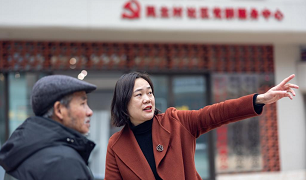-

Pic story: Minzhu village's path to grassroots democracy
March 02, 2025Since a national-level pilot program for urban renewal was launched in Minzhu village in 2021, Wu, a deputy to the Chongqing Municipal People's Congress, has convened numerous "courtyard meetings" where residents were invited to voice their opinions and suggestions.
-
What drives the success of China's whole-process people's democracy?
March 08, 2025The ongoing "two sessions" in China have once again put the global spotlight on the country's unique democratic model -- whole-process people's democracy.
-
Q&A: What to know about whole-process people's democracy in China
March 05, 2025Democracy is a universal value, yet it takes different forms across civilizations. While Western democracies often equate democracy with elections, China has developed a distinct model — whole-process people's democracy — tailored to its national conditions and historical traditions.
-
An NPC deputy's devotion to whole-process people's democracy at doorstep
February 27, 2025As a "post-80s" NPC deputy, Sheng Hong is both a witness and practitioner of whole-process people's democracy. Sheng has always been listening to the needs of residents and their opinions and suggestions on legislative work.
-
Outreach offices give people a say in nation-building process
December 27, 2024By amplifying public engagement in lawmaking, Guo said, China is showing its commitment to refining governance and fostering a more inclusive democracy.
-
Practicing China’s Democracy
October 01, 2024In this video, Jerry Grey, a British media commentator, visited Dongnan village in Lianshan's Shangshuai town to witness how Huang Jiaying, a county-level deputy, expands Chinese hanging gourd farming, and how he makes his own efforts to boost ethnic minority culture.
-
Legislative outreach offices highlight China's whole-process people's democracy
September 15, 2024The establishment of local legislative outreach offices across the country was first proposed at the Fourth Plenary Session of the 18th Central Committee of the Communist Party of China in 2014.
-
Whole-process people's democracy in action at grassroots in Shanghai
July 31, 2024At the legislative outreach office in the subdistrict, suggestions from the public have been solicited on 95 draft laws over the past five years, with 272 suggestions adopted.
links
京ICP备13028878号-11



